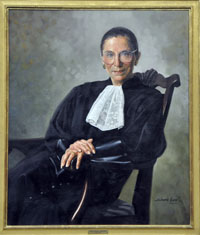“I dissent” is the legal battle cry tearing apart majority opinions and explaining why the court should have ruled differently. Numerous Supreme Court Justices have written these words, but few have done so as movingly as Justice Ruth Bader Ginsburg, popularly known as the “Notorious RBG.” Her resonating, dissenting opinions identify key aspects where the majority of the Justices “got it wrong,” using calculated, precise language that is every bit as quotable as it is influential. Her cutting words are lethal; the pen really is mightier than the sword.
But Justice Ginsburg’s Supreme Court dissents aren’t the only reason she’s such a powerhouse for justice and equality. As a law student, Justice Ginsburg had to balance raising her daughter, caring for her husband while he underwent cancer treatment, and maintaining her position at the top of her male-dominated law school class. Throughout all of this, Justice Ginsburg was fighting against gender discrimination: she was chastised by colleagues and school administrators for “taking a man’s spot” in the law school class, she had difficulty finding a job despite graduating first in her class at Columbia Law School, and when she was offered positions, she was presented salaries that were considerably less than her male counterparts.
Eventually, Justice Ginsburg landed at the ACLU in 1972, where she co-founded and directed the Women's Rights Project. She joined a team of like-minded and influential women - like Pauli Murray, a racial justice pioneer and unabashed feminist, and Dorothy Kenyon, a brazen believer in gender equality - where she challenged the organization's "lukewarm" approach toward women's rights issues.
Justice Ginsburg’s
framework for what constitutes gender discrimination included discrimination against both women and men, and she credits that progressive thinking to influencers like Murray and Kenyon.
Justice Ginsburg had no shame in expressing her beliefs and sharing her experiences as a woman throughout her career, from her time at the U.S. Court of Appeals for the District of Columbia, and later, on the United States Supreme Court. She has driven significant decisions like
Sessions v. Morales-Santana , an immigrants rights case that struck down the Immigration and Nationality Act’s gender deferential, based solely on the now-untenable assumption that an unwed mother is the “natural and sole guardian of non-marital children”;
United States v. Virginia , a gender equality case that struck down a long-standing male-only admissions policy of a public university, and
Olmsted v. L.C ., a disability rights case explicitly recognizing that individuals with disabilities have a right to live in the community rather than institutions.
She has also motivated legislative endeavors, like the passage of the Lilly Ledbetter Fair Pay Act of 2009. Justice Ginsberg continues to challenge the standards for what constitutes fairness and equality on a variety of issues, and is a force to be reckoned with on the bench.
This spring, theaters around the country will begin showing the film “RBG,” a documentary that highlights Justice Ginsberg’s legal legacy and outlines how she has risen to the level of a pop culture icon. The film is expected to draw admirers from all demographics, including law students who are excited to build upon the legal foundation that Justice Ginsburg and so many individuals like her have worked tirelessly to establish.
I am one of those students, and I look up to Justice Ginsburg for her steady yet relentless advocacy. I admire her ability to place power in her meticulously chosen words and to challenge antiquated notions of what justice and equality really entail. I appreciate the way she has inspired women in my life to challenge societal “norms” regarding what it means to be a female member of society and a working mother. I reflect on her tenacity when I have inevitable and unavoidable moments of self-doubt. She’s a beacon of hope for women of many different generations.
Undeniably, Justice Ginsburg’s fearless advocacy has helped society and the law evolve.

